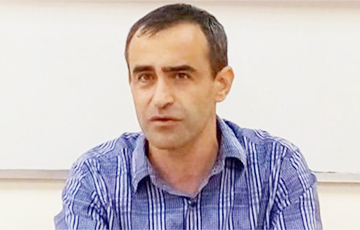Israeli Expert: War With Hezbollah Is Closer Than Ever
1- 25.09.2024, 18:36
- 24,962

The IDF now dictates the rules of the game.
The Israeli army and Hezbollah militants exchange missile strikes.
Should we expect a full-fledged war in the Middle East? Which scenario is it going to be? Charter97.org spoke to Israeli military expert David Sharp about this:
— You can wait, this is quite a realistic scenario, but so far Israel has increased the emphasis on the northern direction, increasing the intensity of attacks on the positions of Hezbollah. This became especially noticeable last week, although the changes began even earlier. In the Gaza Strip, fighting continues, but less significant forces are involved — the main focus is shifted to the north. This reflects strategic decisions made at a high level.
One example of decisive action (although it is not officially recognized, but if we assume that Israel did it) was the destruction of pagers and means of communication belonging to Hezbollah militants. This shows that the rules of the game are now dictated by Israel, although they were previously established by Hezbollah, as early as October 8 last year.
This was followed by several important events that show what, in fact, Israel is trying to do in general terms. One of the key ones is the elimination of Ibrahim Aqil, the main military commander of Hezbollah, and the headquarters of the Redouan unit in the southern part of Beirut. The move made it clear that Israel was no longer responding to Hezbollah's actions, but was acting according to its own plan. Israel makes it clear — despite the possible consequences, it will act on its own, even if it leads to a big war.
On September 23–24, Israel launched powerful strikes on Hezbollah launchers and warehouses, which were located in residential buildings and other facilities. These goals have become a priority. The record day was September 23, when about 1,500 targets were hit with high-precision weapons, 2,000 ammunition was dropped per day. These are very serious indicators, not every country has enough ammunition to drop them in one day on specific targets.
These goals were known in advance, thanks to many years of intelligence gathering. Israel realizes that its actions can provoke a major war if Hezbollah reacts in some strong way. However, the country's leadership is ready for this development and, if necessary, is ready to go far.
Israel's goal is to ensure the return of 65,000 evacuees from the north (including those who left voluntarily) to their homes. This is only possible if their safety is guaranteed. If a real diplomatic settlement is not reached, and only a formal agreement is signed without control mechanisms, people will not feel safe. Such a delay in solving the problem will only aggravate it in the future.
However, the prospects for a real settlement are not yet visible. The enemy is not ready for serious agreements, even half-measures on his part are impossible without striking him a significant blow. Therefore, if Israel wants to achieve radical changes in the situation in the north, it will have to act by force.
From a strategic point of view, a large-scale operation involving ground forces looks like a likely scenario if Israel decides to achieve radical changes. However, Israel has not yet decided to take such a step due to a number of military and political reasons. Instead, we see a gradual escalation. Hezbollah, being at a loss, did not expect Israel to cast aside fears of a major war, so its response is belatedly limited, although it also gradually raises the stakes.
In recent days, the number of rocket attacks has increased: the day before yesterday, 200 missiles were fired, yesterday — 300, while their range is expanding. This morning, a rocket was fired at Tel Aviv, which Hezbollah presented as an attack on the MOSAD headquarters, although it was intercepted. It is important to note the idea — Hezbollah is trying to respond in the spirit of an “eye for an eye”. This is a reaction to the liquidation of another high-ranking commander responsible for the organization's missile forces, which occurred yesterday in Beirut. We are seeing a gradual escalation. For Israel, this may be part of the preparation for a large-scale operation, comparable to artillery preparation before a large operation.
Israel says that if Hezbollah agrees to a settlement, it will be possible to stop the hostilities. It should be understood that a fictitious settlement will be a strategic defeat for Israel, but this is what the United States and France want (which, however, does not play a significant role in this issue). International pressure creates a problematic situation, but it is imperative that Israel does not take steps that will lead to strategic failure. The readiness for a big war has already been demonstrated. Whether a final decision has been made is unknown, but the escalation continues, and logically it can be assumed that everything is heading for a major conflict.
— What is the balance of power today? What might a ground operation against terrorists from Lebanon look like?
— Israel has been preparing for a ground operation and a possible war with Hezbollah since 2006. Current strikes on missile storage facilities and the elimination of high-ranking commanders of the organization show that this has been a priority for reconnaissance for many years. It is worth noting that the ground operation also provides for an air component, over the past day 1,600 targets were hit with high-precision weapons. This is about half or even less of what Israel is capable of deploying in the early days of a full-scale war, underscoring its potential.
A land operation can develop in different scenarios, including very limited ones. However, limiting oneself in actions will not solve the problem — enemy strikes are likely to force Israel to take more decisive measures.
At the moment, options with varying degrees of depth of entry into Lebanon are being considered. The full scenario involves taking control of a significant part, and in fact the entire southern Lebanon — the epicenter of Hezbollah activity. These are the territories where the Shiite community of Lebanon lives and where there are fortified areas and launchers of short- and medium-range missiles capable of shelling northern Israel. The main combat forces of Hezbollah are concentrated there, and the destruction of up to 50–60% of its potential can become the main military target of the operation.
In the deeper regions of Lebanon, where it is most likely not planned to go even in the event of a major operation, Israel can use aviation, artillery and special operations forces.
Hezbollah has been preparing for war with Israel for decades. At its disposal are fortified areas, modern weapons systems and up to 40,000 militants on the first line, half of whom are reservists, the other half are regular forces, including the elite Reduan unit. Hezbollah also has allies, such as the Shiite Amal movement, as well as forces that could come from Syria and Iraq. However, the main military potential is concentrated in Hezbollah itself.
The ground component includes fortified areas, anti-tank guided missiles, mines, mortars and drones designed to attack Israeli troops and the rear. One of the key threats is its huge arsenal of missiles. There are ballistic missiles with a range of 7 to 700 km, there are high-precision and cruise missiles. Hezbollah also has a lot of kamikaze drones and reconnaissance drones at its disposal.
They have air defence systems of Iranian, Russian and Soviet production, which operate in an ambush mode – they hide and turn on at the last moment to try to shoot down Israeli aircraft. Among them are Iranian systems, old Soviet complexes such as the Osa and Kvadrat, as well as the newest Pantsir and Buk, although there are few of them, and some have been destroyed in recent days. Hezbollah also has naval special forces, unmanned boats and a significant number of anti-ship missiles, including the Russian Bastion system.
This is a very serious opponent who is stronger than the vast majority of the world's armies. Hezbollah was specifically preparing for war with Israel, focusing on missile and other long-range systems. In terms of the number of ballistic missiles with a range of 200–700 kilometers, its arsenal is comparable to the leading countries of the world and, perhaps, even exceeds the Russian one at the moment.
This is a serious challenge for Israel. It is believed that the losses in the rear can be hundreds of people, and even more at the front. Therefore, the decision to start a large-scale war is extremely difficult, and they tried to avoid it for a long time. However, Israel is closer to this step now than ever.
Israel is a modern army with its own advantages and, of course, disadvantages. Despite the power of Hezbollah, Israel has enormous advantages. The difficult terrain in Lebanon that complicates the offensive should also be considered. Nevertheless, Israel has significant advantages in firepower, air support, maneuverability, and heavy systems.
Despite the objective and subjective disadvantages, these advantages can be realized. This will achieve the goals associated with the operation in southern Lebanon and inflict heavy damage on Hezbollah.











